“They Just Came, Killed a Bunch of People, Destroyed the City and Left”
What Russian troops did in Bucha and other cities near Kyiv. Testimonies from local residents who survived the “special military operation”
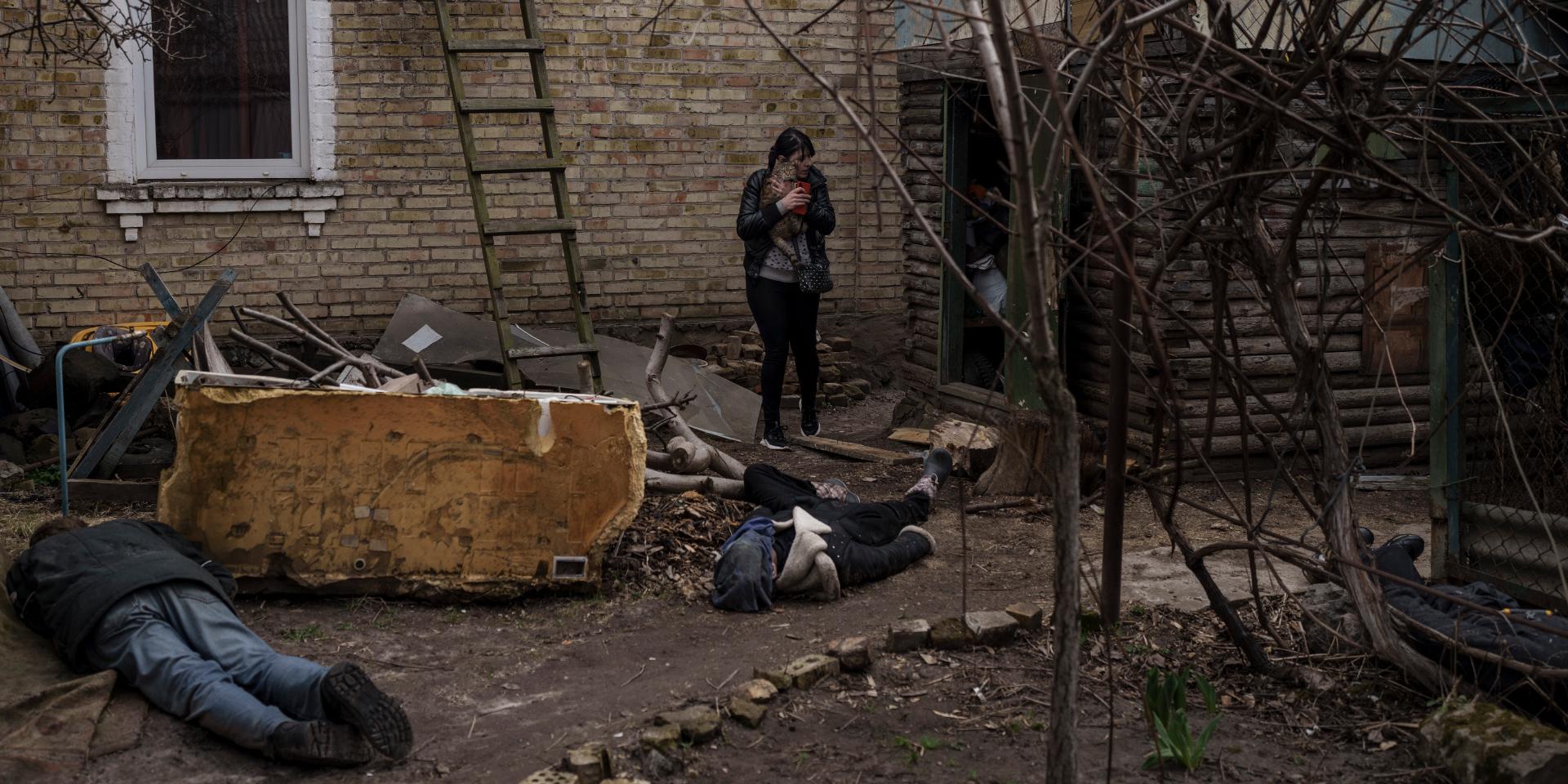
On April 2, the world was shocked by terrible photos and videos of dead bodies of civilians in the city of Bucha, located twenty kilometers from Kyiv and recently liberated from Russian troops. Bodies lay along roads, in the yards of private houses, in basements, in mass graves, and in cars. Sometimes the dead could be seen with their hands tied behind their backs. Ukraine’s president Volodymyr Zelensky visited Bucha and accused Russia of genocide. The Russian Defense Ministry and the Russian president’s press secretary Dmitry Peskov declared it a provocation.
To find out what the Russian army did, IStories spoke to residents of Bucha and other cities in the Kyiv region who survived the invasion.
Bucha: “Don’t go further, or you’ll be shot”
With the arrival of the Russian army, local residents fled from the bombing and shelling to shelter in basements. They couldn’t freely leave their homes or evacuate without permission. Any chance appearance on the street could mean death - the same when crossing the areas of responsibility of different military units. Often, attempts to leave the city also ended in death. There was active shooting and crossfire on every road.
Vlada, a student, lived for 17 days in Bucha during its occupation by Russian troops, on Yablonskaya Street. She now calls it "the alley of corpses." The girl recalls that without the permission of the Russian military, it was impossible even to move around the area next to her own house, let alone leave the city. “If you just left the house, they stopped you, and you said where you were going, then you were not shot. Until you asked permission from them, it was impossible to leave. They said, ‘Walk along this area of the street, Yablonka here (a microdistrict in Bucha. - Ed.), and don’t go further, otherwise you will be shot right away.’”
This is also confirmed by Victor, a resident of Bucha, who lived in the occupied city until March 10. According to Victor, the military warned his grandmother, “It’s better to walk only along the central streets. If we met you in some back alley, we wouldn’t bother with formalities.” On March 10, Victor and his mother, grandmother, and younger brother began to evacuate. From their uncle Victor, who left the city at the beginning of the war, they learned that the evacuation would be in the center of the neighboring city of Irpin, and they went there on foot. “We walked through Yablonskaya street - all these terrible photographs that are everywhere now, were already seen then. It’s just that if someone tried to take a photo and it would have been noticed, he would have received a bullet in the head,” said the young man.
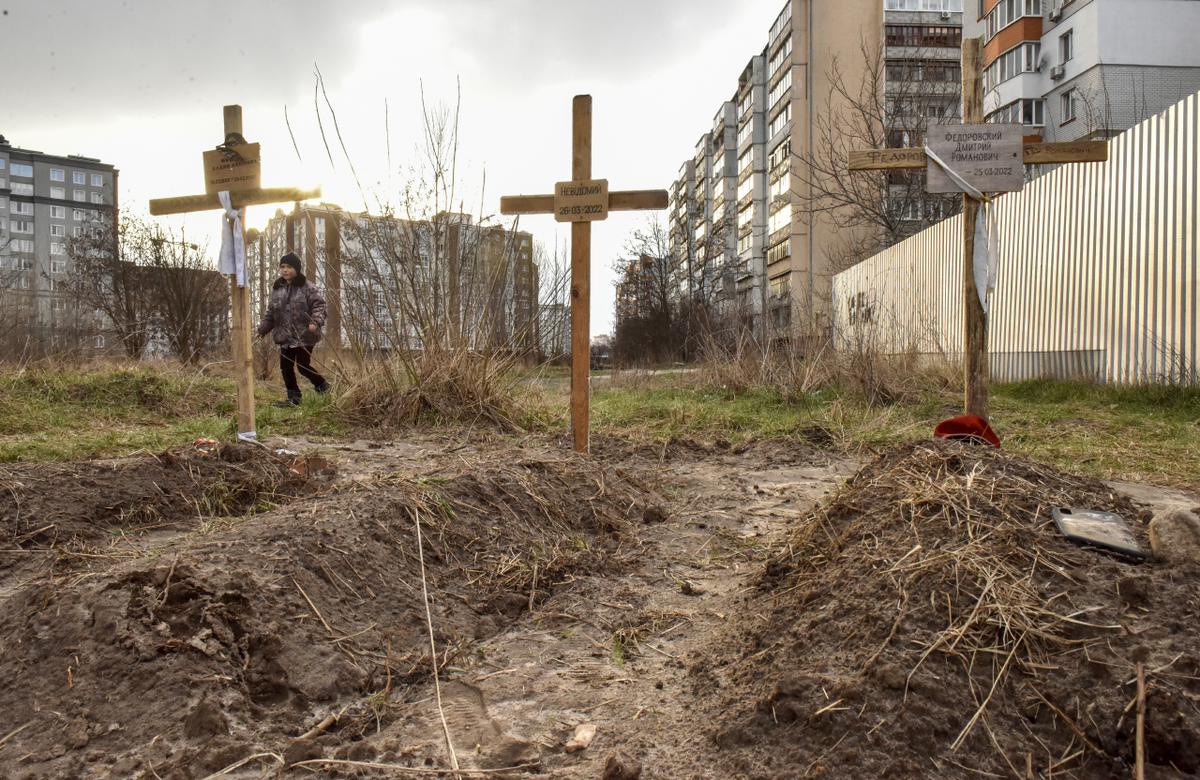
Vlada admits that their family was more fortunate than many neighbors: the Russian soldiers that were on duty next to their house were “more or less tolerable.”
“Not far from us is the house where my mother’s friend lives – her father served in the [Ukrainian] army. He died a year ago. He had some rank and many awards. The Russians, when they entered their house and dug through documents, found that he had fought and got angry. They started shooting at the walls and windows. They didn’t rob anything, they just smashed everything inside.”
“They started asking for alcohol. The neighbor gave them some alcohol. He had no weapons, he behaved calmly, his wife was next to him. A soldier drank this alcohol, and then said that he didn’t like the way the neighbor was looking at him. And shot him in the head”
Vlada also recalls the story of her uncle, who was living in a basement nearby. The Russian military came to the basement and began to check documents. “Those who did not have documents, or who resisted, or started to get aggressive, or wanted to run away – they shot them right away. My uncle did not show any resistance at all – they apparently saw that he had a Russian surname, that he was a ‘normal’ person – and left him alone with his mother.” According to Vlada, when people began to come out from the basement, corpses that had been dumped on the ground blocked their way.
Another resident of Bucha, Margarita, moved to the city with her family a month before the war. When the fighting began, Margarita's family decided to stay in Bucha – they thought that it would be calmer in the suburbs. She talked about how the arrival of the Russian military to the neighbor's house ended. “Literally four days ago, when the Russian troops were still there, they broke into the house of our neighbor – whom I know personally, we exchanged food during the occupation. They [the soldiers] were in a drunken state. They started asking for alcohol. The neighbor gave them some alcohol. He had no weapons, he behaved calmly, his wife was next to him. A soldier drank this alcohol, and then said that he didn’t like the way the neighbor was looking at him. And shot him in the head. They did not touch his wife – she came to my mother-in-law in tears, asking for a shovel to bury her husband. This story was passed to me by my mother-in-law. The wife of the murdered neighbor still lives with my mother-in-law – she’s afraid to return to the house where her husband was killed.”
The Russian military ate “their own” food, sometimes taken from grocery stores, Vlada says. They refused treats from local residents, according to her, "they were afraid that we would poison the food, so they didn’t touch anything." Vlada and her neighbors spoke to the Russian soldiers who were on duty at their house: “They said: ‘We are afraid to go to Kyiv.’ We had young boys, 18-20 years old. The older ones looked more solid, the younger – ragged, and really quite young, not at all the ‘elite Russian army.’ Now the Russian side says that supposedly the main tasks in the Kyiv and Chernihiv directions have been completed, but this is not so: the Russians retreated, they simply canceled the order to storm Kyiv.”
Opposite Vlada's house is her grandfather’s place – she knew all his neighbors. One day, one of her grandfather's neighbors went outside to smoke, and his daughter went to the toilet. “The Russian soldiers who were by us started to say: ‘There are some strange movements there, we’ll now shoot the tank’s main gun into these few houses.’ Everyone began to dissuade them, saying, that there are children, disabled people … please don’t. They obeyed, but ran over to check. The neighbor, frightened, reacted stupidly: he ran and closed the door with a lock. The Russian shouts: “Stop, now I’m going to fuck you up!” A second threw a grenade through the window. Thank God, no one died, but the glass flew out, one of the family members got hit in the head. When they saw that women and children were there, they [the Russians] began to apologize. The next day, the Russian military brought them four bags of food looted from our stores and a bottle of wine each.”
Russian soldiers shot Vlada's godmother’s husband in the neck when he went out on the balcony at noon to smoke. They didn't let him go to the hospital until the next morning. When they were finally allowed to leave the house, Vlada's godmother loaded her husband into a wheelbarrow and took him to the hospital. “Now he will never be able to talk, it’s a miracle he survived. On that day, the doctor in the hospital saved more than one man with a wound in his throat – many did not survive.
Bucha: “[My] child vomited several times, it was so scary”
On March 3, Artyom, a resident of Bucha, received a call from his mother – Russian soldiers had knocked on the door of the basement where she was hiding and demanded that she leave. When the soldiers convinced them to open the door, the Russian military transferred them – Artyom's mother, sister, grandmother and everyone who was in the basement with them – to warehouses with building materials. For some time, Artyom was able to stay in contact with his relatives. His mother said that they were constantly bringing new people – there were at least a hundred of them – and that the soldiers gave cookies to the children. On the same day, Artyom's uncle told him that Russian soldiers went from house to house and took everyone outside, and then contact with him was lost.
On March 9, Artem's mother got in touch again and said that they were going home. Whether all the detainees were released from the warehouse, she does not know – the pensioners were the first to be released. Uncle Artyom was also let out. After everyone else in the family, on April 3, Artyom's grandmother left Bucha – she could not leave her disabled friend. She told her grandson that “there are corpses of people on the street, arms and legs torn off,” and that after Artyom’s mother left, the Russian military “went into home every day, looted, and then they started shooting all the men.” Grandma said she cried every day.
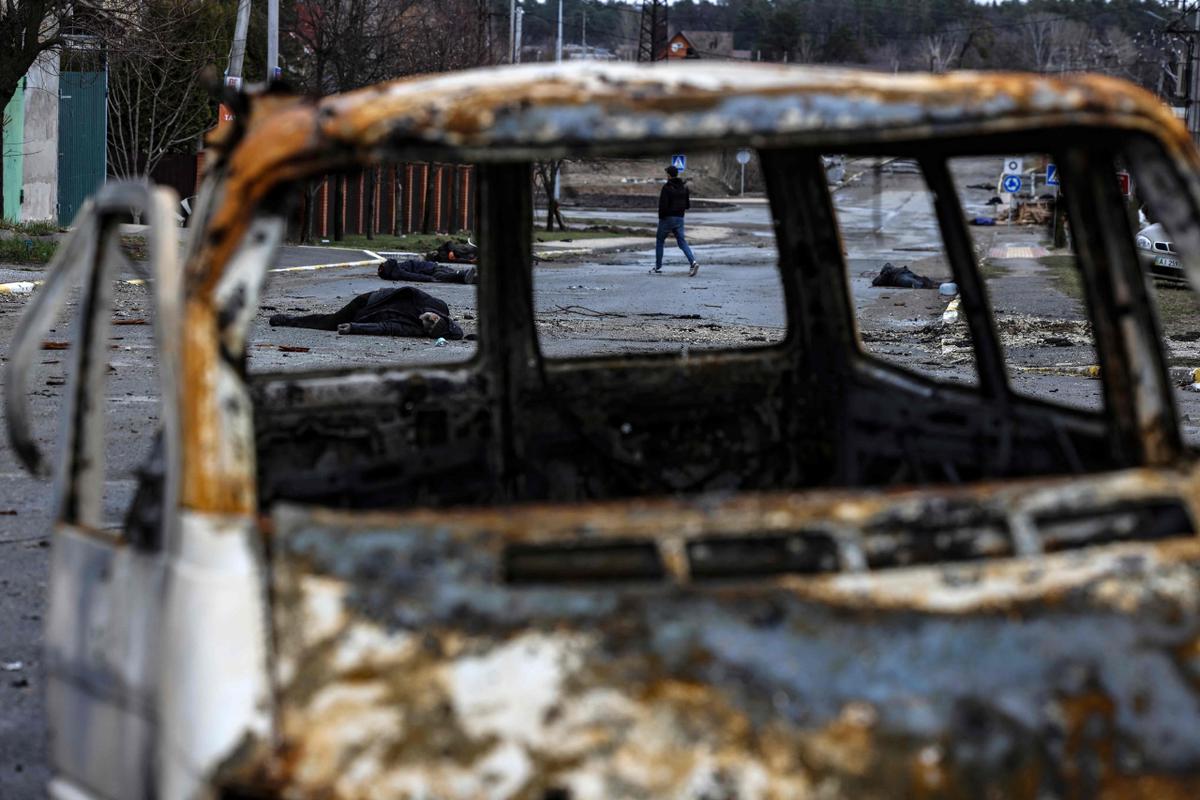
Vlada's family managed to leave Bucha only on the 17th day of the occupation. According to the girl, the corpses of civilians were on the streets from the first days, but only on the day of departure from the city she was able to see the whole picture: “When Russians say that it’s a provocation, that it’s our soldiers [the Armed Forces of Ukraine] that killed them, when [the Russian army] had already left – this is all not true. Because already on the 17th day [of the occupation], there were corpses lying there. Ours [Ukrainian soldiers] couldn’t have killed them, because it was Russian territory and our guys, if they even started to make their way there, they would have been killed.” Vlada also saw with her own eyes the shot-up cars of civilians with corpses inside.
“We asked the senior [officer] for permission to evacuate – I don’t know how to explain, I don’t know military terms. For some reason, we were not allowed to for a long time, we were just kept and kept and kept. We thought that we would not reach the place for evacuation. The ‘Green Corridor’ began in the city center, and we lived on the outskirts. It takes about three minutes by car to get there [to the city center], and we drove for 20 or 30 minutes, because the speed was just the minimum, so that we would not be shot on the way.” When the Russian soldier stopped Vlada's family’s car for a check, he took away everyone's phones, returning the SIM cards. “I had a laptop on my lap, I didn’t think to hide it, and the Russian says to me, ‘I’m taking the phone, but hide the laptop so [other Russians] don’t take it.’”
“During the period that we walked from home to the gathering place, all the roads were in shambles, many were killed – I stumbled several times over the bodies of the dead. They were all civilians, there were women, elderly people. The administration building also had many bodies around it, no one removed them. Only people from neighboring houses covered the dead with sheets or billboards so that the children would not see”
Another resident of Bucha, Margarita, mother of three, also talks about how difficult it was to evacuate. According to Margarita, sometime during the third week of the war, information appeared in the news that there would be an evacuation from Bucha to Kyiv – to the Vokzalnaya metro station. Many did not leave their houses – they were afraid – but Margarita along with her children and other women went to the city center, where people were gathered.
“During the period that we walked from home to the gathering place, all the roads were in shambles, many were killed – I stumbled several times over the bodies of the dead. They were all civilians, there were women, elderly people. The administration building also had many bodies around it, no one removed them. Only people from neighboring houses covered the dead with sheets or billboards so that the children would not see. We came in the morning, two thousand people gathered,” the woman recalls.
Margarita said that it was very cold that day, and people were constantly told that the buses would come. But they never did. While she was at the city center, her mom (who lives in Germany) was able to get through to her. She had also seen on the news about the evacuation and asked if her daughter had left with her children. “I told her that there are no buses,” says Margarita. We stood in a line along the administration building. At some point, tanks drove past us, armed Russian soldiers were sitting on them. I was afraid that they were waiting for a provocation, but reason prevailed, everyone behaved calmly – phones were hidden. As a result, I stood for six hours in the snow and wind with children of three, six and fourteen years old. My child even vomited several times, it was so scary.” Margarita, along with other people, did not wait for buses that day.
“The curfew was approaching. We were told to wait, but it is clear that if we had waited, they would have had a “green light” to shoot us after the curfew. Everyone ran home. Some people got into cars, hung white flags on the windows, wrote “children” and drove ahead,” Margarita said. A few days later, the evacuation was announced again, but, according to the womanl, the buses did not come again. “We cooperated with other people and also decided to drive our cars. There were 15-20 cars in the column. We drove not far and saw cars on the side of the road, which a few days ago were the first to go – they were shot-up. I saw six cars, there were dead people in them,” the woman recalls.
On the way, the convoy of cars crossed several checkpoints. The first were Russian ones. Margarita said that not everyone was able to pass them: “We were very worried that we would be detained, because our men were with us. At the first Russian checkpoint, we were checked and let through. We went, but suddenly we heard from behind that they started shooting. Everyone immediately went faster. My husband was in the car behind me, and I even thought that he had been shot. Not everyone reached the second checkpoint, several cars were shot-up. What they didn’t like about those cars is not clear. We passed the second checkpoint calmly – the third checkpoint was Ukrainian. After that one we stopped, everyone went out, smoked, hugged and cried. My husband has many acquaintances in Bucha, during the war he lost ten people.
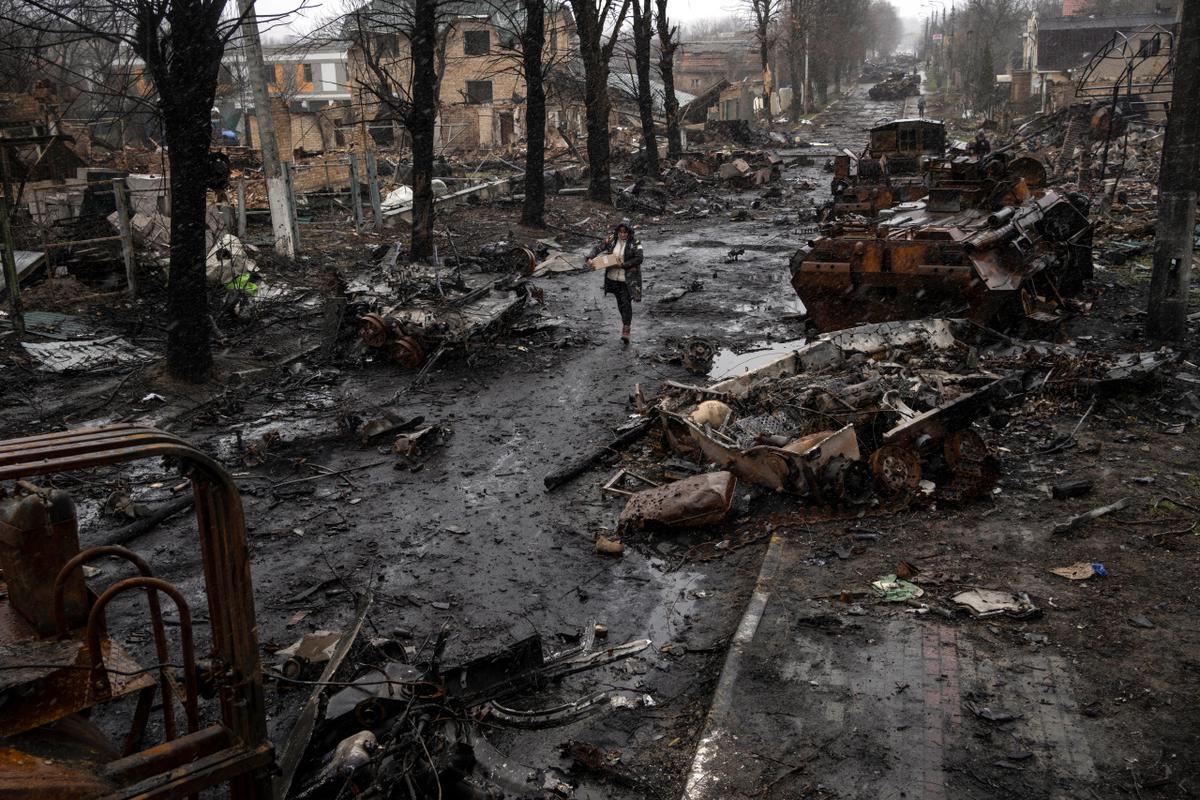
Tatyana, a resident of Bucha, left the city on March 14. She said that the Russian military asked them to give other residents a ride. “When we were leaving, the military asked us to help drive one woman home, and asked if we had a place in the car. When we returned to the column, another soldier asked to take a woman with dogs”.
Not everyone took advantage of the opportunity to evacuate from the occupied city. Vlada's grandfather refused to leave his house. “The first three days after our departure, he called every day, saying that everything was fine. Then the connection was lost for five days – we were very worried,” says Vlada. “I thought that either the phone was dead, or he was no longer alive. He miraculously got in touch, literally yesterday or the day before yesterday – he said that the Russians came, smashed the phone and cut the charger so that he couldn’t charge it in any way (grandpa was charging the phone from the battery in the car). They broke the phone, but he was able to fix it. When Bucha was freed and grandpa saw our [Ukrainian] soldiers, he cried. He was very pro-Russian, loved Putin – watched only their [Russian] news. After what he saw during the occupation of Bucha, he became a patriot of Ukraine. His idea of the Russian world has been shattered.”
Irpin: “Not soldiers, just marauders and bastards”
Residents of other cities in the Kyiv region also have something to say about the actions of the Russian military. Vyacheslav and Anna, brother and sister, were able to leave Irpin, occupied by Russian troops, on March 12. It’s hard for Vyacheslav to find words when he describes what they experienced during the occupation: “What happened there is horror, it’s a nightmare, it’s sadism, it’s the genocide of the Ukrainian people. Please forgive me for these words, but this is the way it is. I can say one thing: they [the Russian military] are not soldiers, they are just marauders and bastards.”
“They drove by, these tanks, they started to shoot around. And when it became more or less calm, I ran out and looked. And I saw how these people burned ... They were buried across the street from our complex in the yard”
Vyacheslav said that when the Russian troops entered Irpin, he, along with his neighbors, took refuge on the basement floor of his five-story building. He cries when he remembers how Russian soldiers shot his acquaintance before his eyes and he saw a woman with a child burning.
“I went out for a smoke and saw Russian tanks marked with the letter V entering. My acquaintance, God rest him, was standing at a checkpoint – he was in the defense. I'm just not fit, I would like to join them. And then the tank began to turn, we had a gas distribution station near the building in front of the barrier ... And this tank just shot at the man, and the man was gone. There was a pool of blood left. There was nothing to bury, just nothing. And right next to this gas station, a mother with a child burned. They drove by, these tanks, they started to shoot around. And when it became more or less calm, I ran out and looked. And I saw how these people burned ... Marina and Ivan Met. They were buried across the street from our complex in the yard.”
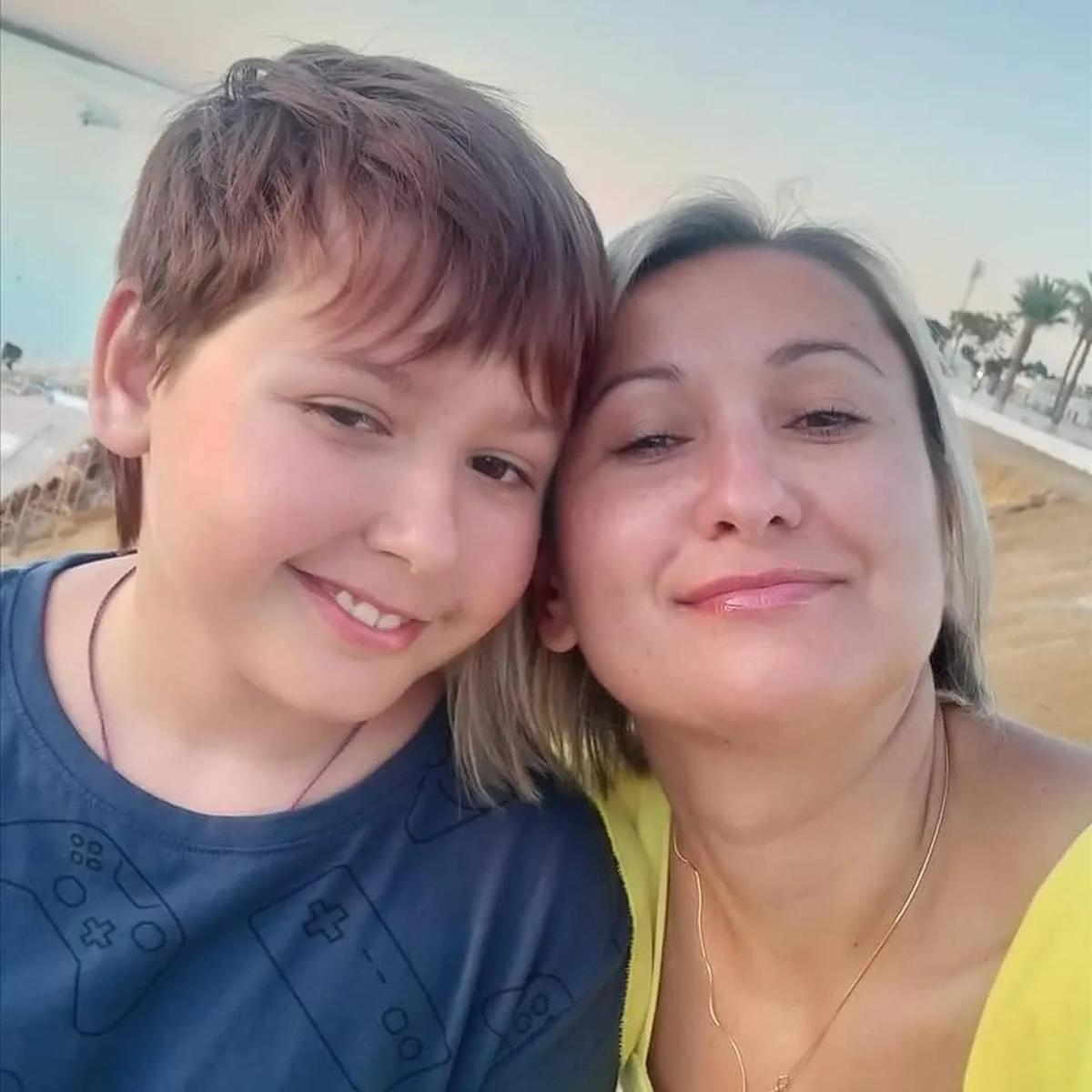
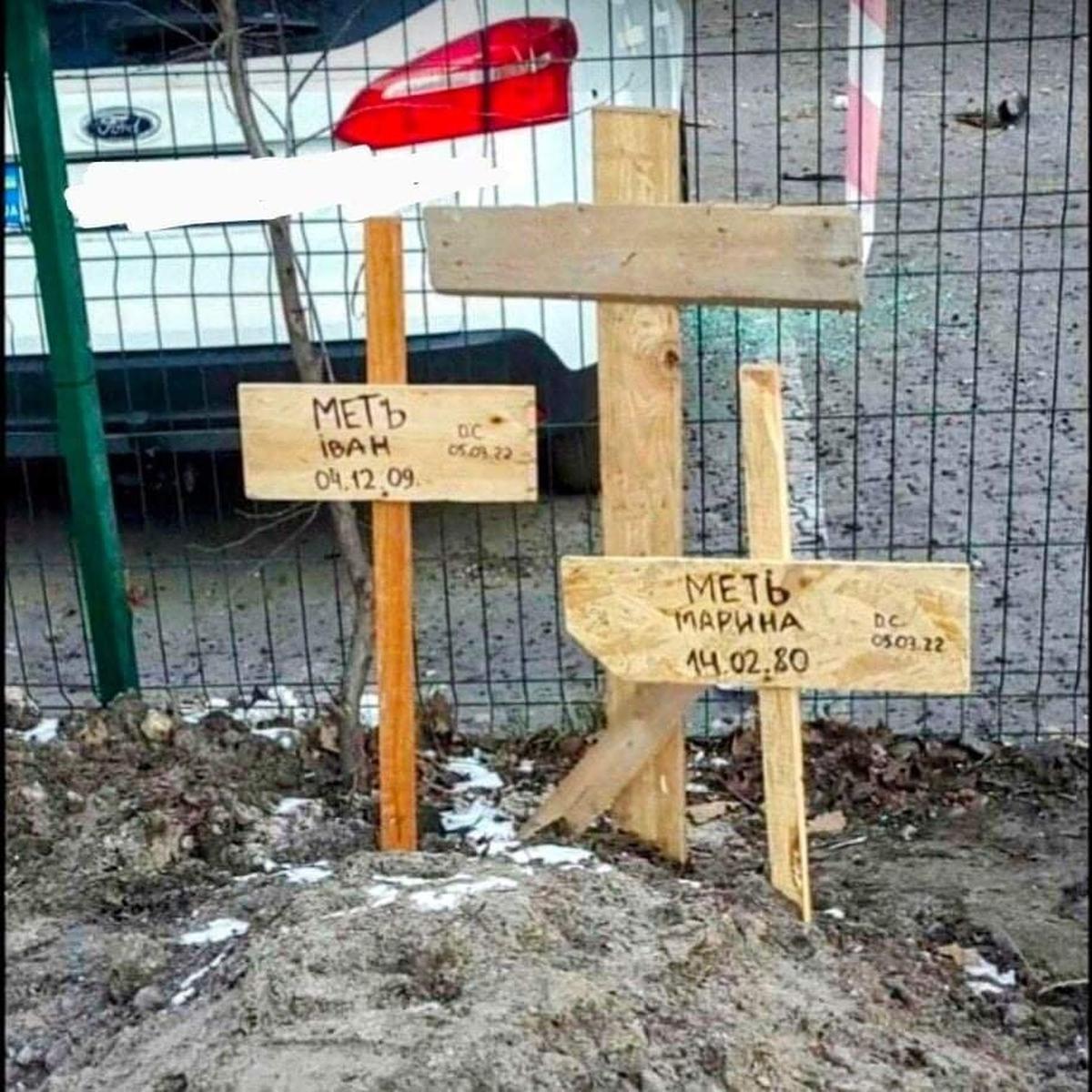
Vyacheslav's sister Anna recalls that since February 24, explosions from Bucha and Gostomel were constantly heard in Irpin, and a week and a half later they heard explosions in their residential complex. When Russian tanks entered the territory of their housing complex, they [Russians] started robbing shops, says Anna.
“Our windows overlook the store, and when we were able to go up to our fifth floor, we looked out the windows through the curtains and watched what they were doing there. This one was just shocking. They got drunk there, trashed things. When they opened stores with things, they tried on the things, then when they didn't like something, they threw it on the ground. They opened the cash registers and took the money.
The next day, they stuffed equipment, clothes, food into their tanks, which were standing on the territory – they have like…storag, trunks or drawers, I don’t know how they’re called correctly, this trunk. So they closed it all up and began to leave the area of the residential complex. I counted 17 tanks. Each tank has a minimum of four people.
When they left, people began to come out and chat. I personally spoke with the man, he said that he was taken prisoner. He was in a pharmacy, these ‘rushiks’ (pejorative nickname for Russian soldiers. — Ed.) came in, they took him out by the arms. They smashed his phone, but they gave back the SIM card. And they said that if civilians do not touch them, then they will not touch civilians.
When we began to walk around the area, we saw that all the cars were open. All the trunks were open, glove compartments. They obviously rummaged through these cars. It was evident that they were trying to drain the fuel from the cars, because the things were open everywhere – the things where gasoline is poured.
When we left, three houses in our residential complex had no windows at all, and one had a gaping hole in the middle.”
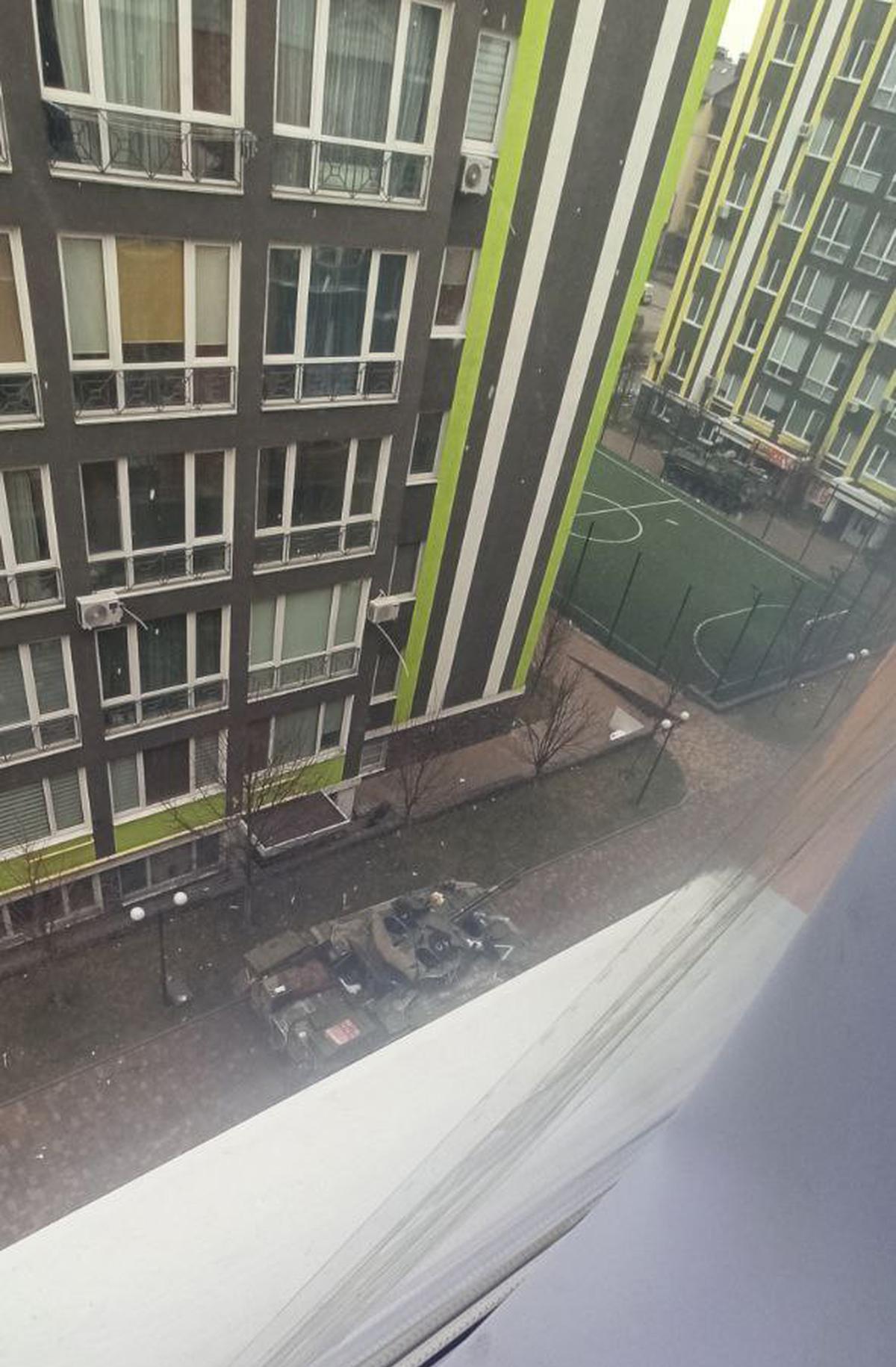
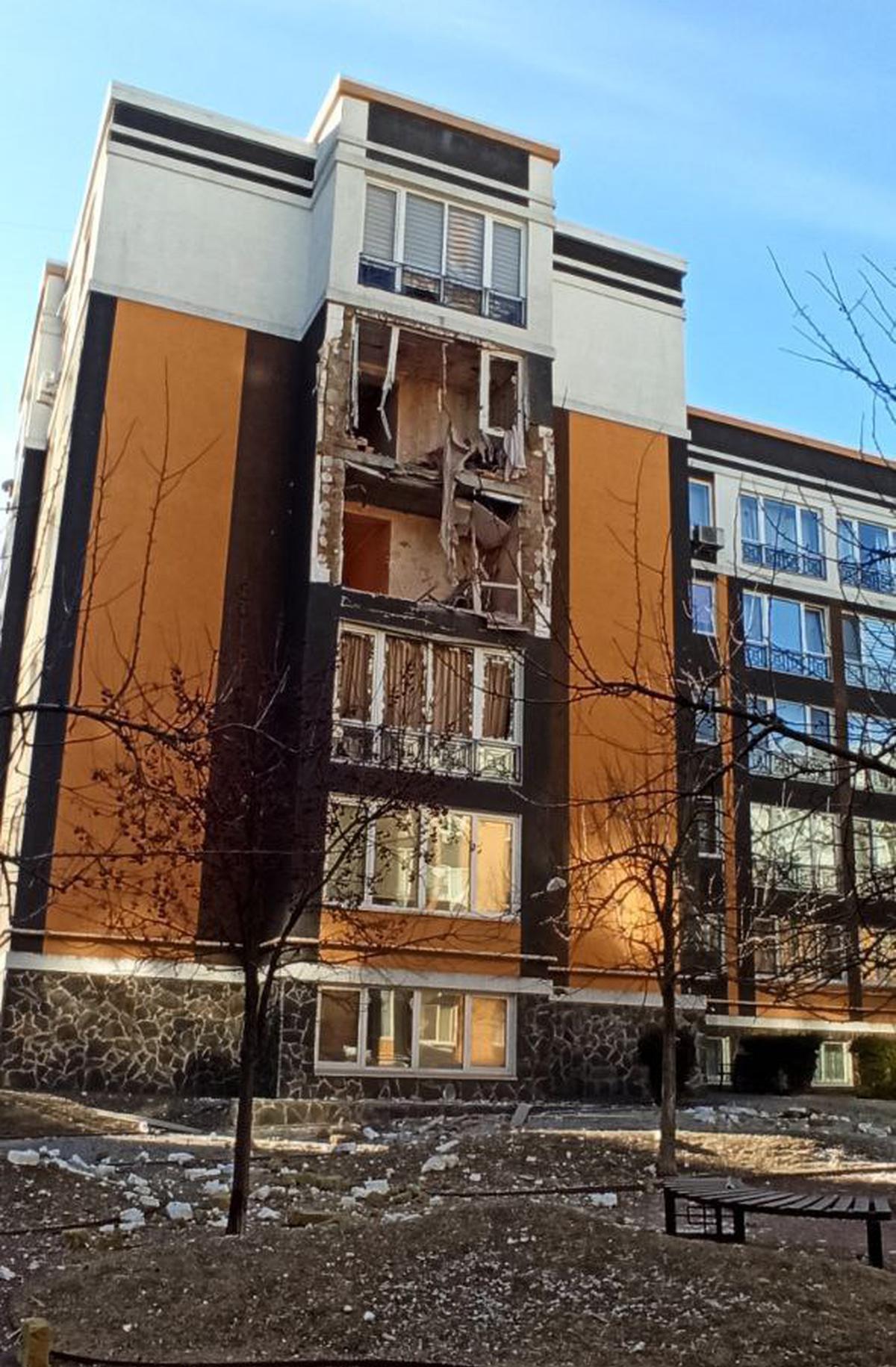
Anna said that about a week after that, it was relatively calm in Irpen, and then the bombing began again. A shell hit a neighboring house and demolished two floors. The next day, volunteers arrived at their residential complex, took them – five people and two animals – and drove them to Romanovka near the border with Kyiv. “Many thanks to them [volunteers], they tried to support us both morally and physically — my brother was ill, the ambulance helped him. When we drove around Irpin, we saw that these houses cannot be restored, they just need to be demolished and rebuilt. When we were standing at Romanovka, I turned my head, and there [in the direction of Irpin] everything was black, everything was just on fire there. It was terrible."
Vorzel: “Mom’s jewelry has already been removed”
Katya and Misha Tkachev from the resort village of Vorzel, in Kyiv region, are twins – they are 18 years old. Their own mother abandoned them, and at the age of two they were adopted by a married couple – Valery and Natalya Tkachev. When the war began, Misha was in Kyiv, spending the night with a friend. He could not return to Vorzel, as the bridge was blown up there, and hostilities had begun. Katya was stuck in a village occupied by the Russian army with her mom and dad – they were hiding in the basement of a barn, with a neighbor named Daniil.
“They shot at her parents. They first shot Valery – six bullet wounds in the back – and he fell face down. Then they shot Natalya from a machine gun – the bullets hit her under the chest – and she fell on her back”
There were many neighbors around, also hiding in basements, including in destroyed houses. They periodically went up to the house to take something or draw water. Katya told a family friend, Anatoly, about what happened on March 3 – the girl herself is currently in a state of shock and refused to talk.
“At some point, they heard the roar of engines, and Natasha said to her husband, ‘Valera, let’s go outside, we’ll stop [them], what is this going on?’ Anatoly describes the situation. “Maybe mom had some kind of nervous breakdown. At that time it was the seventh day of the war. They went out to stop this vehicle – the neighbors saw it. Katya heard shots – they shot at her parents. Then she heard screams.” Neighbors of the Tkachev family said that they first shot Valery – six bullet wounds in the back – and he fell face down. Then they shot Natalya from a machine gun – the bullets hit her under the chest – and she fell on her back. Eyewitnesses also said that, according to their assumption, Chechens were the shooters, judging by their Caucasian accent.
Natalya and Valery Tkachev were killed on March 3, between 17.28 and 17.30. On the same day, Katya and Daniil, who remained in the basement, ran out of food. Three days later they found raw potatoes at their neighbors’ and ate them. For the next seven days, they only had water to drink. When volunteers arrived for Katya and Daniil, the girl was able to put notes with names under her dead parents, and cover the corpses with a blanket. As it turned out, Daniil's father was also shot. “Katya said that when she last saw her mother lying on the ground, her mother seemed to be smiling,” says Anatoly. “When Katya left, she saw that they had already removed jewelry from her mother and taken away her phone – either looters or the military.”
Only after the liberation of Vorzel from the Russian army was it possible to get through to the chief of defense of the village. Thus, it became known that Natalya and Valery Tkachev were buried in the courtyard of their own house on March 14, three days after Katya was escaped.
Journalists: “Dead drivers flew off into a ditch”
The battles for Bucha, Irpin and other cities close to Kyiv went on throughout March. The shelling continued on March 31, when Ukrainian troops had already regained Irpin. On April 1, the Armed Forces of Ukraine entered Bucha, abandoned by Russian troops. The mayor of Bucha, Anatoly Fedoruk, said that the city was liberated from the Russian army on March 31, but his video message was also published on April 1.
During the entire month of the occupation, the Russian military lived among the locals, sometimes occupying their housing and eating food from local supermarkets. Sometimes they killed civilians. On April 2, journalists were allowed into Bucha, who began to publish terrible footage – the corpses of people lying on the streets of the city and in basements, killed with their hands tied behind their backs. At the moment, 410 corpses have been taken from the territory of the Kyiv region for examination, said the Prosecutor General of Ukraine Irina Venediktova.
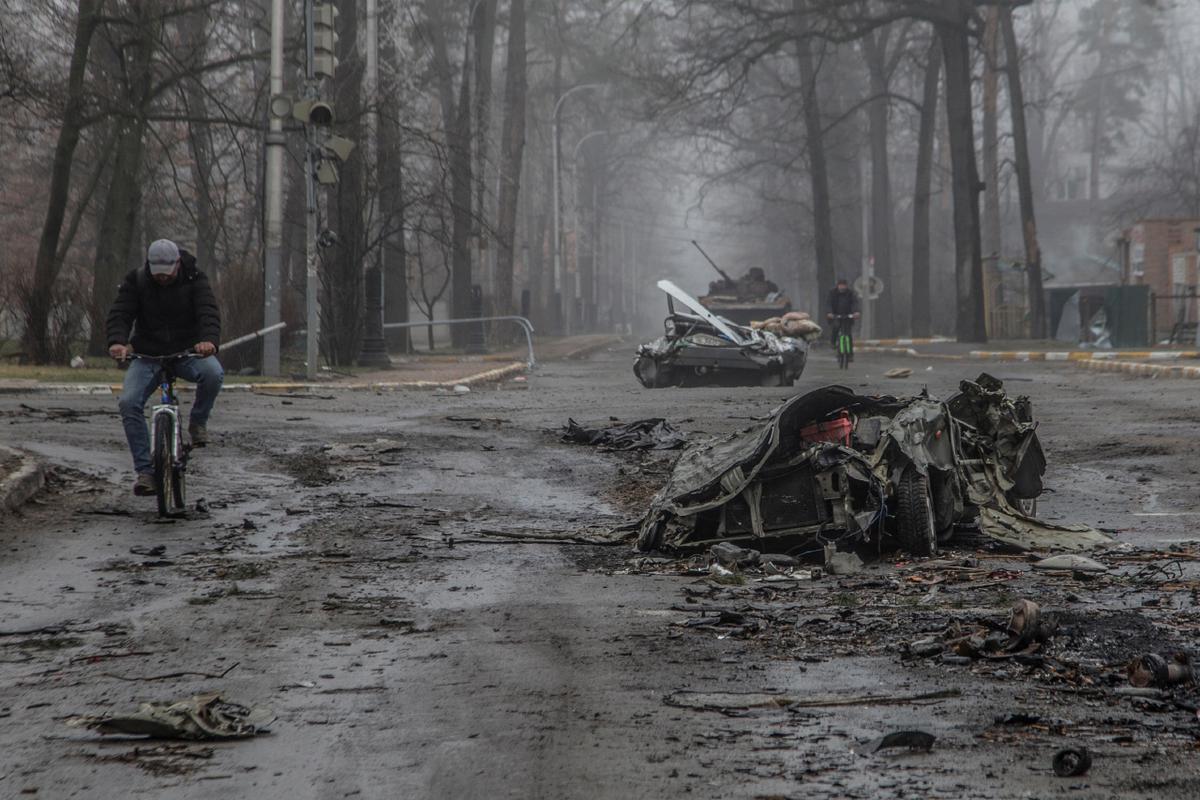
Ukrainian TV presenter Dmitry Komarov was in the first police car that entered Bucha and Irpin. Referring to the stories of local residents, he writes that Russian soldiers fled in a panic, trying to take with them everything they “looted” as they were surrounded by the Armed Forces of Ukraine.
“The quote from RussTV [Russian television] ‘the tasks of the special operation have been completed’ is a classic lie. Unless the task was the genocide of the Ukrainian people, the destruction of civilians and the destruction of peaceful cities. This ‘task’ Russian soldiers completed. You must have seen yesterday photos and videos from the streets of Bucha, littered with corpses. But this is not the only place. I write – and in my head there are ‘flashes.’ Here is a dog barking near the owner's body. For the whole week. Here is a man with his hands tied and shot in the head. And here a guy without a head, with keys near his hands. He didn't make it home. Together with the police, sappers and the National Guard, we are removing the shot-up cars with civilians from a ditch. <...> Murdered pensioners, young families, burned-out cars with skeletons. I saw everything with my own eyes. Cars were fired upon. Entrance holes - windshield. Dead drivers flew off into the ditch,” Komarov describes.
Journalist Dmitry Durnev told IStories that in Irpin, which had been liberated earlier, there were no more corpses on the street now. In Bucha, which he reached on April 3, bodies were still lying there. “The corpses that are stuffed into the cars have not been removed yet. For example, in the city center a tank drove straight through a "Tavria" [small passenger car], and there was a man behind the wheel – that is, you approach the car, you smell, you see, and ear sticks out. According to lawyer Lavrenty Kukhaleishvili, the name of the murdered man was Sashko – he was an employee of the Bucha Zelenbud utility company, and he “looked after parks and squares.”
“Eyewitnesses said that Sashko took an injured man to the hospital. When he returned, his car was shot at and run over by a tank!” Kukhaleishvili wrote.
Such cases are not isolated, says Durnev: “At the crossing to Vorzel there is a Renault, in which you see a bunch of rags, but you don’t understand what’s there. And it was a grandmother, mother and daughter. The daughter was wounded, the mother lived, and the grandmother had her head totally destroyed – and this bunch of rags is she.
In addition to the corpses of civilians, journalist Dmitry Durnev saw the bodies of the National Guard: “Two bodies of National Guard members lie on the Buchansky Bridge. One body was burned, and the second body is without legs, without an arm – it seems it had burns, and there is a holster on it, and it says ‘Sergeant Ashurkov,’ I think.” From conversations with local residents, Durnev realized that these bodies had been lying on the bridge for a month, including that they had been there when the city was occupied by the Russian army. The journalist told Important Stories that he saw several mined objects in Irpin: for example, a civilian car and a blockade of logs.
“I looked at the courtyards of residential buildings in Gostomel, in Bucha - they covered them with some kind of fragments of boxes when they cleaned the houses: they opened the windows and threw them away,” says Durnev. - In Hostomel, I was in a quarter in which there are small houses with front gardens and cellars – all the cellars are open, near many there are "preserves" (home canned food stores. –Ed.), which are broken. I looked in – like sacks of potatoes were there, but in the “preserve” they were simply looking for something to eat. And it was written there: “Akhmat strength”, “wolves”, “05.03”… Locals say that [in the city] there were bad Chechens at first, then they left and polite Chechens came, and in the end they brought in kids [very young soldiers]. And now the kids are already running off.
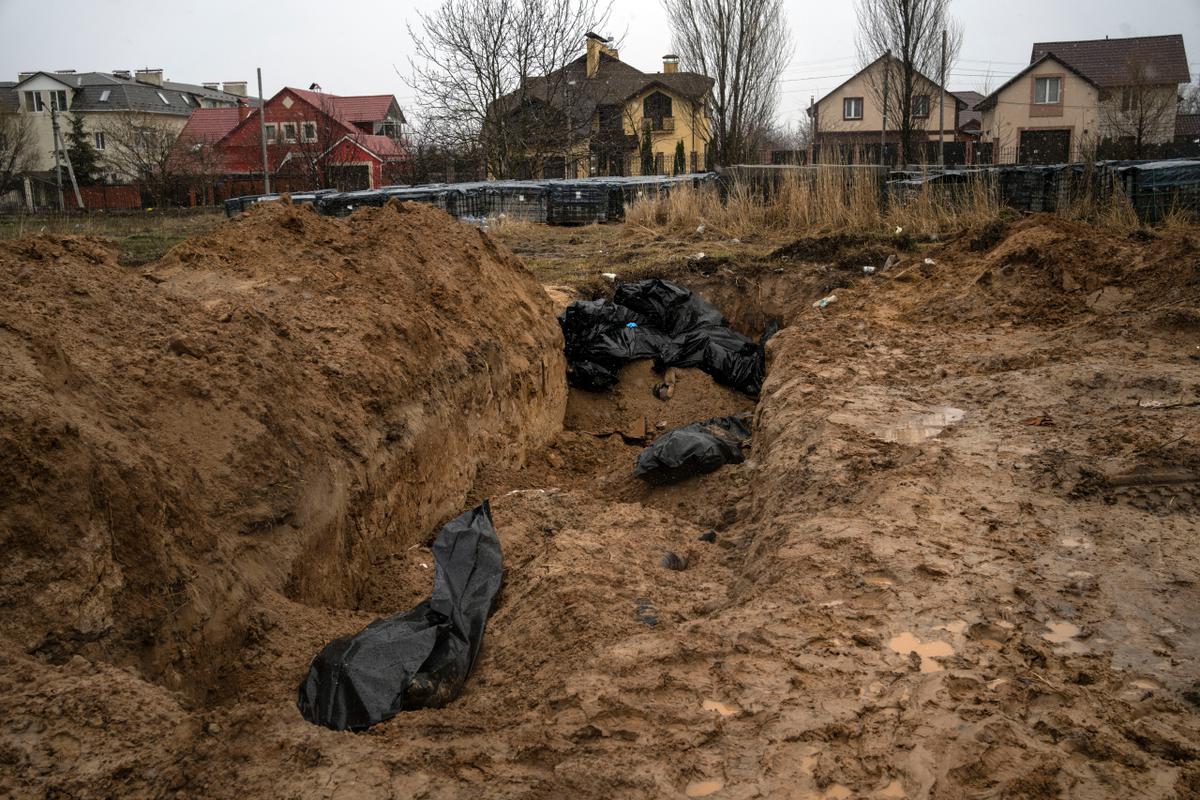
In the liberated cities, according to eyewitnesses, there are not many people left now. “These are people who are very attached to their roots, to housing, to basements, to something else. And they are not going to leave,” says Durnev. “That’s what they said: we just fought off the marauders here. Those who are alive, they are sure that the Russians did not loot the apartments in which there were people, because there were enough empty ones. They went and broke down the neighbors' doors, and thus they saved their own apartments from marauders – now they don’t leave so that criminal marauders don’t take something ... I don’t know what they are guarding there, what’s the point in that.
Mikhail Polenchak was among a group of photographers who took the first shots of the liberated Ukrainian towns and cities in the Kyiv region. “A very difficult day emotionally. Broken bodies, shattered lives and destinies. The continuous suffering of people who didn’t want war... There is no strength to show more than one photo right now. Dead civilians on the side of the highway, 20 km from Kyiv, Ukraine, April 2, 2022. Under the covers, one man and 2-3 dead naked women (probably meaning burnt bodies. -Ed.) – they tried to burn all of them together on the side of the road,” he wrote on his Facebook account.
“The worst thing is that this is a pogrom for the sake of pogrom, violence for the sake of violence, without any meaning. They just came, they killed a bunch of people, they destroyed this city, plundered it and left – and that's all…”
Ukrainian Channel 24 journalist Denis Kazansky recorded several videos after the withdrawal of Russian troops from Bucha. “Bucha is just a nightmare. Cars with people shot-up, crushed by tanks, corpses of civilians on the streets, broken houses, looted shops. It is difficult to call those who arranged all this people. I don't even know what words they deserve. Maybe these are some kind of mutants... whose feelings that are responsible for humanity have atrophied,” the journalist writes in the introduction to one of his videos, in which he shows a local resident, Antonina Pomazanko. She, together with the Ukrainian military, was raking a pit littered with boards in which she buried her daughter. According to the journalist, the girl was shot dead by the Russian military on the first day of the occupation, when she simply went out the gate to look at the Russian military column.
Kazansky recorded an 8-minute video in which he showed destroyed houses, looted shops, burned and shelled cars with traces of bullets. “The worst thing is that this is a pogrom for the sake of pogrom, violence for the sake of violence, without any meaning. They just came, they killed a bunch of people, they destroyed this city, plundered it and left – and that's all …” Kazansky testifies. “The ‘Russian world’ left these houses in this state, just a mess.”
The journalist demonstrates barricades made from anything you can find – even a water cooler and refrigeration equipment from the store. Around the city, the Russian military left inscriptions on the fences, saying that residents would be shot when crossing the restricted zone, with a V sign. On the doors of one of the cars that journalists found on the outskirts of Bucha, the inscription “Children” was spray-painted on the doors. This did not save the car from coming under fire – its wheels were pierced by bullets, and the fate of the children and their parents is unknown.
A day after the news about the massacre of the inhabitants of Bucha appeared, ambulances continued to take out the bodies of the dead. At the intersection of Staroyablonskaya and Ivan Franko streets, Kazansky saw a burned family with children, a total of five or six people. “I don’t know on which social network these photos can be posted,” the journalist writes.
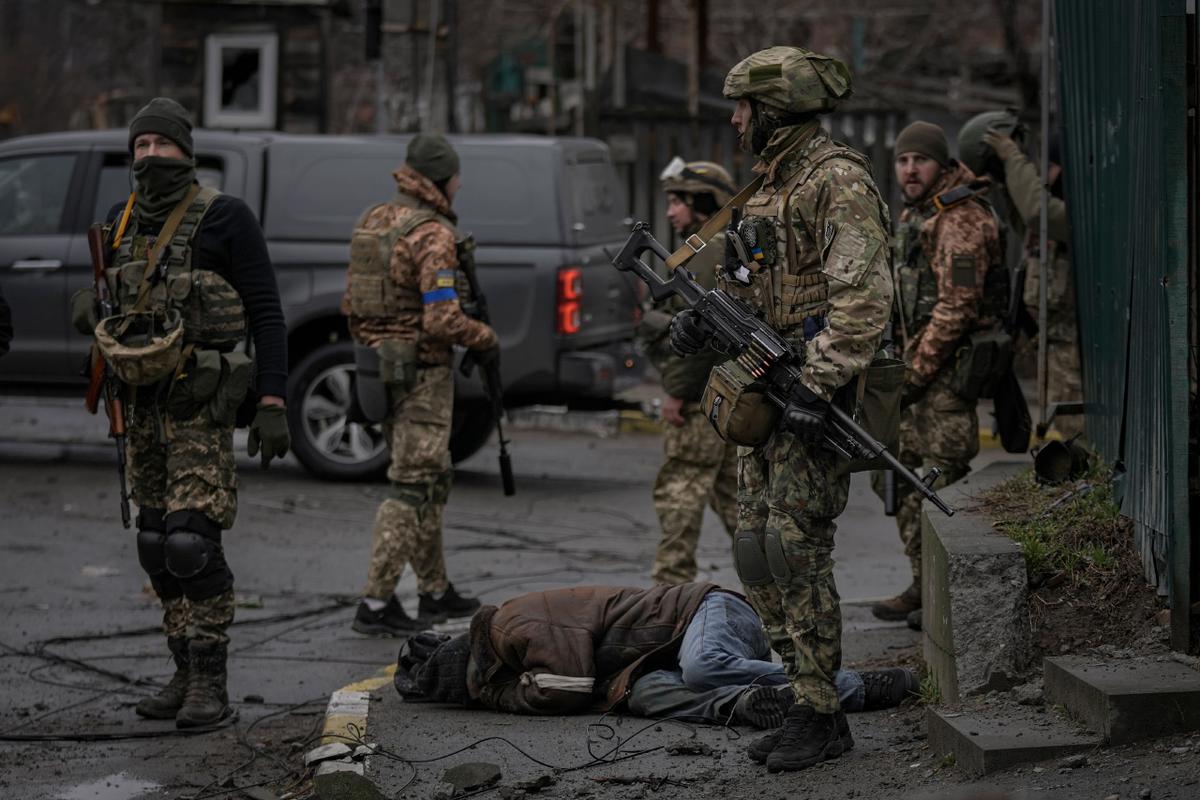
Radio Liberty war correspondent Levko Stek said on his Facebook page that the situation in Bucha is “even worse than I imagined.”
“Of course it’s too early to talk about any figures, but, just for example, I managed to see only part of one street. That is a small piece of the puzzle taken from the big picture. And there were about a dozen dead. And these are only those whose bodies I saw myself. There are many more stories of executions. Some of the bodies have already been removed, some were buried right next to the entrances of ordinary residential buildings. We have yet to find out these terrible statistics,” says Stek. “However, for two days now I have been worried about another question: why? Why shoot old women or teenagers? Why shoot defenseless men and women? How can you just take the life of a person who does not pose a threat to you. I have already gone through a million versions, but each one is somehow weak. It seems that no arguments are enough. Witnesses usually speak clearly – there was no reason, plan and strategy. They just could do it, so they did. I don’t know, there must be some explanation, because in my 30s I don’t yet understand people.”
Judging by his video, the first evidence of reprisals against local residents was received on March 30, when the journalist first visited the city of Irpin after the withdrawal of Russian troops. “The units of the RF Armed Forces left the settlement, and their handiwork (probably referring to the guns of the Russian army. -Ed.) continues to hit the empty streets. Because of this, it is not possible to even remove the bodies of dead civilians immediately,” Stek writes, adding that the price of the Russian invasion paid by Irpin has yet to be counted, but it is extremely high.
Human rights defenders: “Unspeakable deliberate cruelty”
The non-governmental international organization Human Rights Watch discussed war crimes in a report, regarding what took place in the territories of Ukraine occupied by Russian troops. Human rights activists recorded eyewitness accounts of what happened in the Chernihiv, Kharkiv, and Kiev regions from February 27 to March 14. They interviewed 10 people – victims, witnesses and local residents of the occupied territories. Among the crimes: repeated rape; two cases of summary execution; other cases of unlawful violence and threats against civilians; robberies. “The cases we documented amount to unspeakable, deliberate cruelty and violence against Ukrainian civilians,” said Hugh Williamson, Europe and Central Asia director at Human Rights Watch.
A teacher from Bucha told Human Rights Watch that on March 4, the Russian military seized five men, forced them to their knees, and shot one of them in the back of the head. “He fell down,” the witness said, “and the women screamed.” According to her, before that, the military brought about 40 people to the place of execution. After several hours of standing in the cold, the eyewitnesses were taken home. The four men remained on their knees. The Human Rights Watch source managed to leave the city on March 9. According to her, the body of the murdered man lay in the same place – what became of other men is not reported.
A woman named Victoria told how, in the Chernihiv region in the village of Staryi Bykov, on February 27, the Russian military detained her 29-year-old son Bohdan and 39-year-old brother-in-law Olexander. Then she saw their bodies, along with four others who had been killed. Their hands were tied and their heads were shot. The murder of other men was confirmed by their relatives, following from the report of Human Rights Watch. The Russian military allowed the dead to be buried only on March 7. Volodymyr (40 years old), Olexander (40 years old), brothers Ihor (31 years old) and Oleh (33 years old) were buried together with Bohdan and Olexander.
Another witness said that in the village of Zabuchie, on March 4, Russian servicemen threatened to shoot him and his son after they searched their house and found a hunting rifle and gasoline there. They ordered his 34-year-old son to strip naked: they said they would look for "nationalist tattoos." His daughter corroborated his account in a separate interview.
Forty-year-old Dmytro, one of the Human Rights Watch sources, fled Bucha with his family. They sheltered for two nights in the basement of a two-story building in Vorzel, with a group of local residents. Dmytro said that there was a woman with them in the basement who had chest and leg wounds. She died the next day, on March 8. He and several local residents buried her outside the bomb shelter. He was told that on March 6, Russian soldiers threw a smoke grenade into the basement. Several people panicked and ran outside, where Russian soldiers fired at them. The woman was wounded and a 14-year-old child was shot in the head and killed.
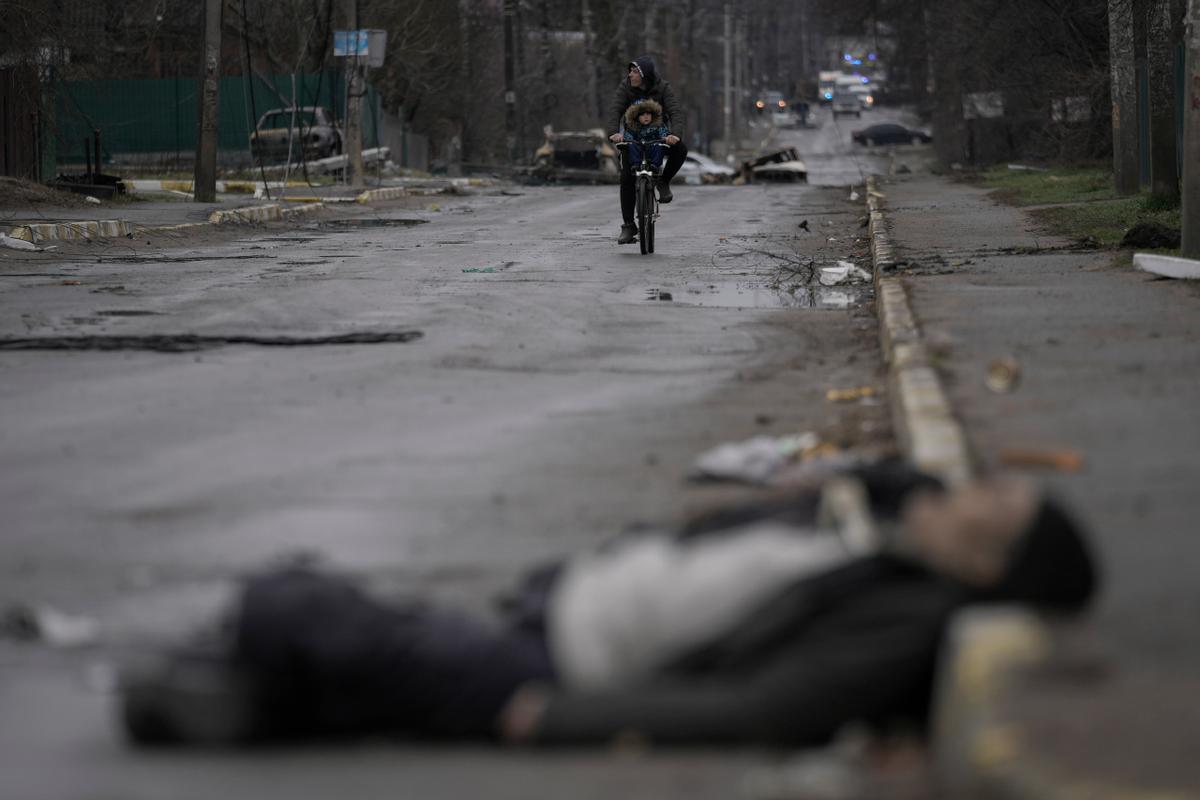
A 31-year-old woman from the village of Malaya Rohan in the Kharkiv region said that, on March 13, she was repeatedly raped by a 20-year-old Russian soldier. He beat her and cut her face, neck, and hair with a knife. It happened at the school, in the basement of which she was hiding with her 5-year-old daughter, mother, 13-year-old sister and 24-year-old brother. The next day the woman fled to Kharkiv. Photographs that she shared with Human Rights Watch show cut marks and bruising on her neck and face.
Human Rights Watch received three other allegations of sexual violence by Russian soldiers in other villages in the Chernihiv region and in Mariupol but has not been able to independently verify them.
Many of the Ukrainian civilians we interviewed described Russian forces taking food, firewood, clothing, and other items such as chainsaws, axes, and gasoline.
Human Rights Watch notes that all parties to the armed conflict in Ukraine are obligated to abide by international humanitarian law, or the laws of war, including the Geneva Conventions of 1949, the First Additional Protocol to the Geneva Conventions, and customary international law.
Willful killing, sexual violence, torture, and inhumane treatment of captured combatants and civilians in custody, as well as pillage and looting, are prohibited. Commanders of forces who knew or had reason to know about such crimes but did not attempt to stop them or punish those responsible are criminally liable for war crimes, Human Rights Watch concludes.